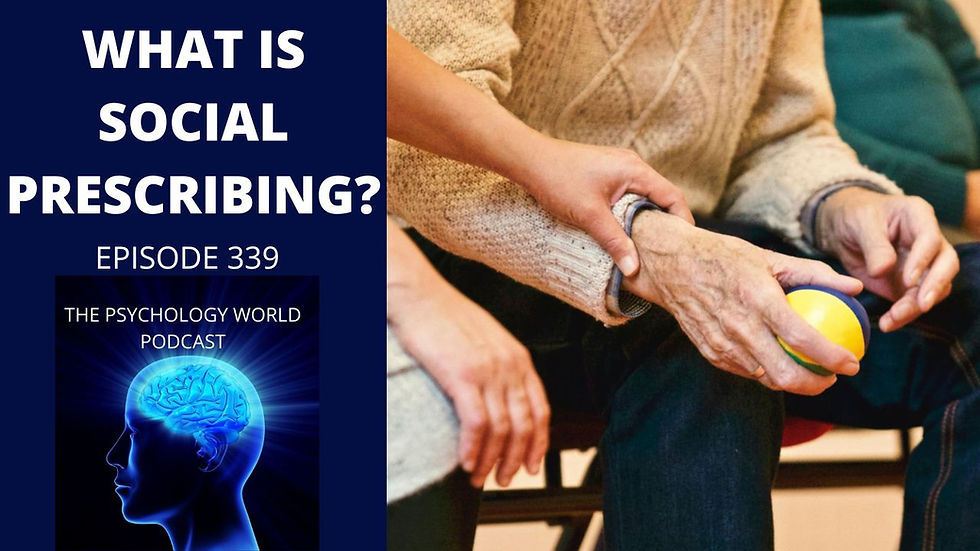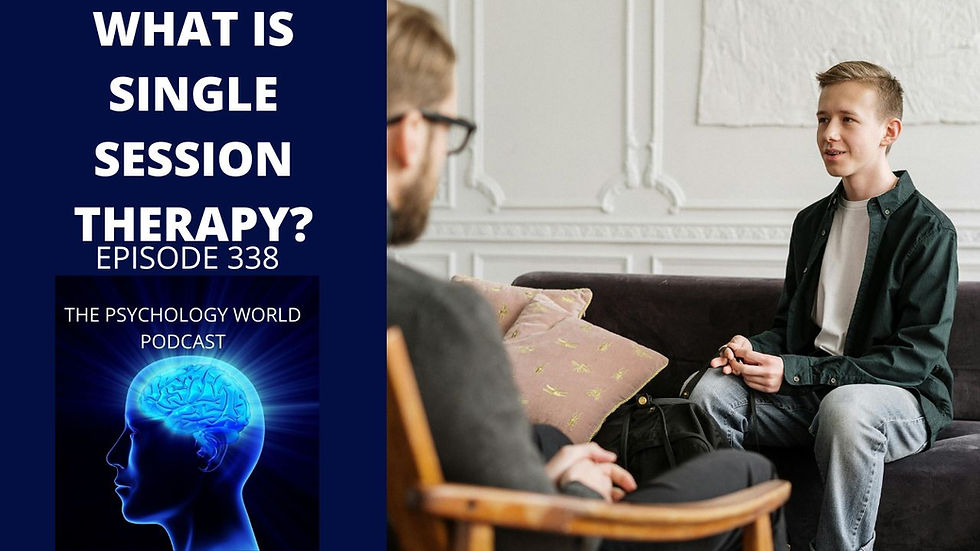What is Social Prescribing? A Clinical Psychology Podcast Episode.
- Connor Whiteley

- Aug 11, 2025
- 6 min read

Recently, as I continue to search for a mental health-related job to do after my clinical psychology MSc, I came across a job for a Social Prescriber Line Worker. I applied for the job, I got an interview but I have little idea what a social prescriber actually does. Chances are, you don’t either because this is a very new job role in the United Kingdom’s National Health Service, but it serves a very interesting, unique and important role in modern mental healthcare. Therefore, in this clinical psychology podcast episode, you’ll learn what is social prescribing, how does social prescribing fit within the larger mental health job market and how can social prescribing improve lives. If you enjoy learning about mental health, careers in psychology and multidisciplinary approaches to therapy. Then this is a brilliant episode for you.
Today’s psychology podcast episode has been sponsored by Working With Children and Young People: A Guide to Clinical Psychology, Psychotherapy and Mental Health. Available from all major eBook retailers and you can order the paperback and hardback copies from Amazon, your local bookstore and local library, if you request it. Also available as an AI-narrated audiobook from selected audiobook platforms and library systems. For example, Kobo, Spotify, Barnes and Noble, Google Play, Overdrive, Baker and Taylor and Bibliotheca.
What Is Social Prescribing?
Social prescribing, according to the NHS, is a major part of Universal Personalised Care and this is an approach to mental health that seeks to connect people to services, groups and activities in their community. These activities seek to meet the social, emotional as well as practical needs of the person to improve their health and wellbeing.
In addition, social prescribing isn’t limited to one clinical population or one age group. Instead social prescribing is an all-age, whole population approach to healthcare that can work even better for people who are lonely or isolated, they have complex social needs that might impact their mental health, they need support with low-level mental health difficulties and they have one or more long-term conditions.
The person who does the social prescribing is called a social prescribing line worker and these Line Workers work for local agencies, like social care, local charities and health services. Also, these Line Workers give people time to focus on what matters to them so together the client and the Line Worker can co-produce a simple personalised care and support plan. As well as the Line Worker helps people to take control of their own health and wellbeing.
Personally, I flat out love this approach to mental healthcare so far, because it is built on the same reason why I love formulation. We are the experts in psychological theory and research, but the client is always the expert in themselves, their life and their lived experience. This is why we always need to work with the client to co-produce a care plan, so they feel empowered and like they can take back control. Especially, because in my experience, depression, anxiety and other mental health conditions steal that power from a person.
Coproducing care plans can help clients to get that sense of power back.
In addition, I really like how Line Workers mean we can reduce waiting lists because instead of clients with low level mental health difficulties being abandoned until their difficulties become severe enough that they need to be added to a waiting list for longer-term, more expensive psychological therapy, we can put them in touch with local services that might help improve their mental health and wellbeing. This is essentially another, less official version of behavioural activation. By helping someone with a mental health condition to take part in and do what they love then it can lead to positive mental health outcomes, to grossly oversimplify.
Line workers are a part of Primary Care Networks (PCNs) and the idea behind this is that it allows every person in England to access a social prescribing service through their General Practice.
Furthermore, social prescribing line workers support existing community groups to be sustainable as well as accessible for everyone. Equally, they help people to start new groups and line workers work with all local partners, so no one is left out. Essentially, I understand this mentality as a sort of “a rising tide lifts all boats” mentality. In other words if all social groups are thriving then everyone benefits in society.
What Difference Does Social Prescribing Make?
According to the NHS, there is a growing body of evidence showing the stark positive impact that social prescribing can have on individuals, like the report by Dayson and Batty (2020). Research shows that social prescribing gives people more control over their lives so this improves their mental health, as well as service evaluations show that social prescribing reduces pressure on NHS services. Such as, a reduction in A&E attendance, GP Consultations and hospital bed stays for people. As well as in 2017, the University of Westminster found that social prescribing leads to 28% fewer GP consultations and 24% fewer A&E visits.
It's clear that social prescribing does have a starkly positive impact on people and their mental health, and it has wider benefits for the National Health Service too.
What Makes A Good Social Prescribing Scheme?
Finally, a good social prescribing scheme is made up of support for community groups, a common outcomes framework, workforce development, easy referral from all local agencies, a co-produced personalised plan that is based on what matters to the client you’re supporting as well as collaborative commissioning and partner working.
Also, social prescribing link workers are employed to give time to people to focus on what matters to them. These are the key factors that make a good social prescribing scheme.
Clinical Psychology Conclusion
Whilst social prescribing is a relatively new form of mental health support, I strongly believe that it’s important for aspiring and qualified psychologists to be aware of. In case you’re like me and you’re close to finishing your time at university, you’ll be looking for mental health-related jobs so we can get the practical work experience we need to be able to apply for the Doctor of Clinical Psychology in a few years. Getting involved in social prescribing work might be a useful first step as we continue our psychology journey.
Just a thought.
What do you think?
I really hope you enjoyed today’s clinical psychology podcast episode.
If you want to learn more, please check out:
Working With Children and Young People: A Guide to Clinical Psychology, Psychotherapy and Mental Health. Available from all major eBook retailers and you can order the paperback and hardback copies from Amazon, your local bookstore and local library, if you request it. Also available as an AI-narrated audiobook from selected audiobook platforms and library systems. For example, Kobo, Spotify, Barnes and Noble, Google Play, Overdrive, Baker and Taylor and Bibliotheca.
Have a great day.
Clinical Psychology References and Further Reading
Dayson, C., & Batty, E. (2020). Social prescribing and the value of small providers-evidence from the evaluation of the Rotherham social prescribing service.
Evers, S., Husk, K., Napierala, H., Wendt, L., & Gerhardus, A. (2024). Theories used to develop or evaluate social prescribing in studies: a scoping review. BMC Health Services Research, 24(1), 140.
Haslam, S. A., Haslam, C., Cruwys, T., Sharman, L. S., Hayes, S., Walter, Z., ... & Young, T. (2024). Tackling loneliness together: A three-tier social identity framework for social prescribing. Group Processes & Intergroup Relations, 27(5), 1128-1150.
https://www.england.nhs.uk/personalisedcare/comprehensive-model/
https://www.england.nhs.uk/personalisedcare/pcsp/
https://www.england.nhs.uk/personalisedcare/social-prescribing/faqs/
https://www.england.nhs.uk/personalisedcare/workforce-and-training/social-prescribing-link-workers/
https://www.england.nhs.uk/primary-care/primary-care-networks/
Sachs, A. L., Kolster, A., Wrigley, J., Papon, V., Opacin, N., Hill, N., ... & Litt, J. (2024). Connecting through nature: A systematic review of the effectiveness of nature-based social prescribing practices to combat loneliness. Landscape and Urban Planning, 248, 105071.
Scarpetti, G., Shadowen, H., Williams, G. A., Winkelmann, J., Kroneman, M., Groenewegen, P. P., ... & van Ginneken, E. (2024). A comparison of social prescribing approaches across twelve high-income countries. Health policy, 142, 104992.
I truly hope that you’ve enjoyed this blog post and if you feel like supporting the blog on an ongoing basis and get lots of rewards, then please head to my Patreon page.
However, if want to show one-time support and appreciation, the place to do that is PayPal. If you do that, please include your email address in the notes section, so I can say thank you.
Which I am going to say right now. Thank you!
Click https://www.buymeacoffee.com/connorwhiteley for a one-time bit of support.







Comments